AI/ML
AI Agents in Marketing: Key Use Cases, Applications, Best Practices, and Benefits
Written ByYash Vibhandik
CEO, Bitontree
Published:12 March 2025
30 minutes read

What if you could streamline marketing processes, improve efficiency, and innovate faster without piling on more work? AI agents are already making this vision a reality for marketing. From automating routine tasks to personalizing customer interactions, they free up your marketing team to focus on what truly matters: growth and strategy.
Digital marketing used to be like going on a road trip with just a paper map. Even though it was fun, it required a lot of manual effort and guesswork, and there were a few hiccups along the way. You have to research keywords, schedule posts, and track performance manually, hoping to hit the right audience with the right message at the right time.
Here’s when you enter AI agents - and suddenly, you are upgrading to a GPS that plots the fastest route, predicts traffic, and even suggests scenic detours. These autonomous systems are advancing rapidly, going beyond responding to commands to executing complex tasks independently.
With digital marketing AI agents, campaigns learn, adapt, and optimize themselves in real-time, transforming marketing from a manual journey into a data-driven adventure. Just as digital maps revolutionized road trips, AI agents are now redefining digital marketing.
But what exactly are AI agents? Let us break down the capabilities behind the AI agents, how they work, and why they are game-changers in revolutionizing your marketing strategy!
Understanding AI agents and their capabilities in marketing
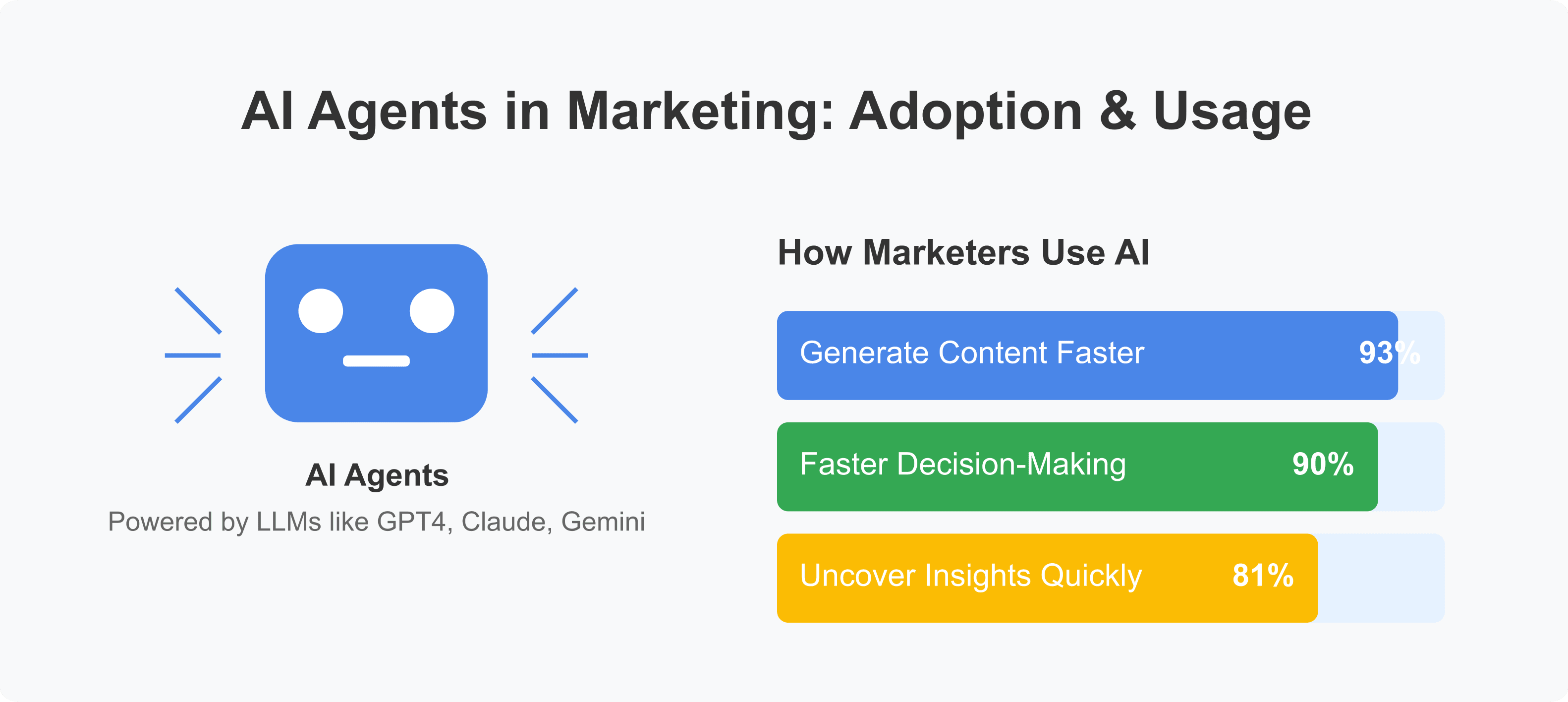
An AI agent is software designed to perform tasks autonomously. Unlike traditional software that follows stringent rules, AI agents use advanced technologies like LLMs (Large Language Models) - such as GPT4, Claude, and Gemini - to make decisions based on their understanding. It allows them to move beyond static commons, adapting to achieve a defined goal.
You can think of them as your digital assistant, who isn't just here to follow orders; they are here to think, plan, and act to help the marketers. According to a recent report, Marketers are already using AI, 93% of them use it to generate content faster, 81% of them use it to uncover insights more quickly, and 90% of them use it for faster decision-making.
Imagine running an ad campaign for a new skincare product. Traditional marketing might involve manually identifying target demographics using limited, static data. It requires significant time and effort, relying on surveys and labor-intensive methods to gather insights. These insights will become quickly outdated as customer preferences evolve, making it challenging to keep your campaigns relevant and effective.
AI agents, however, will take this targeting to a whole new level by analyzing vast amounts of data in real time. It identifies niche semesters like users' search terms and delivers personalized ads. It will ensure precise targeting that will keep your campaigns aligned with evolving customer behaviors. Some of the distinctive capabilities that make AI agents stand out in marketing are:
-
AI agents are sophisticated software programs that use AI for complex marketing tasks. They leverage machine learning and natural language processing to analyze data and execute strategies autonomously.
-
AI agents adapt to changing conditions in real-time, unlike traditional tools. They can analyze millions of customer interactions across multiple channels to create hyper-personalized content in seconds.
-
AI agents excel in predictive analytics, forecasting future trends and customer behaviors. They transform content marketing, customer service, and paid advertising through automation and optimization.
Core features of AI agent for marketing
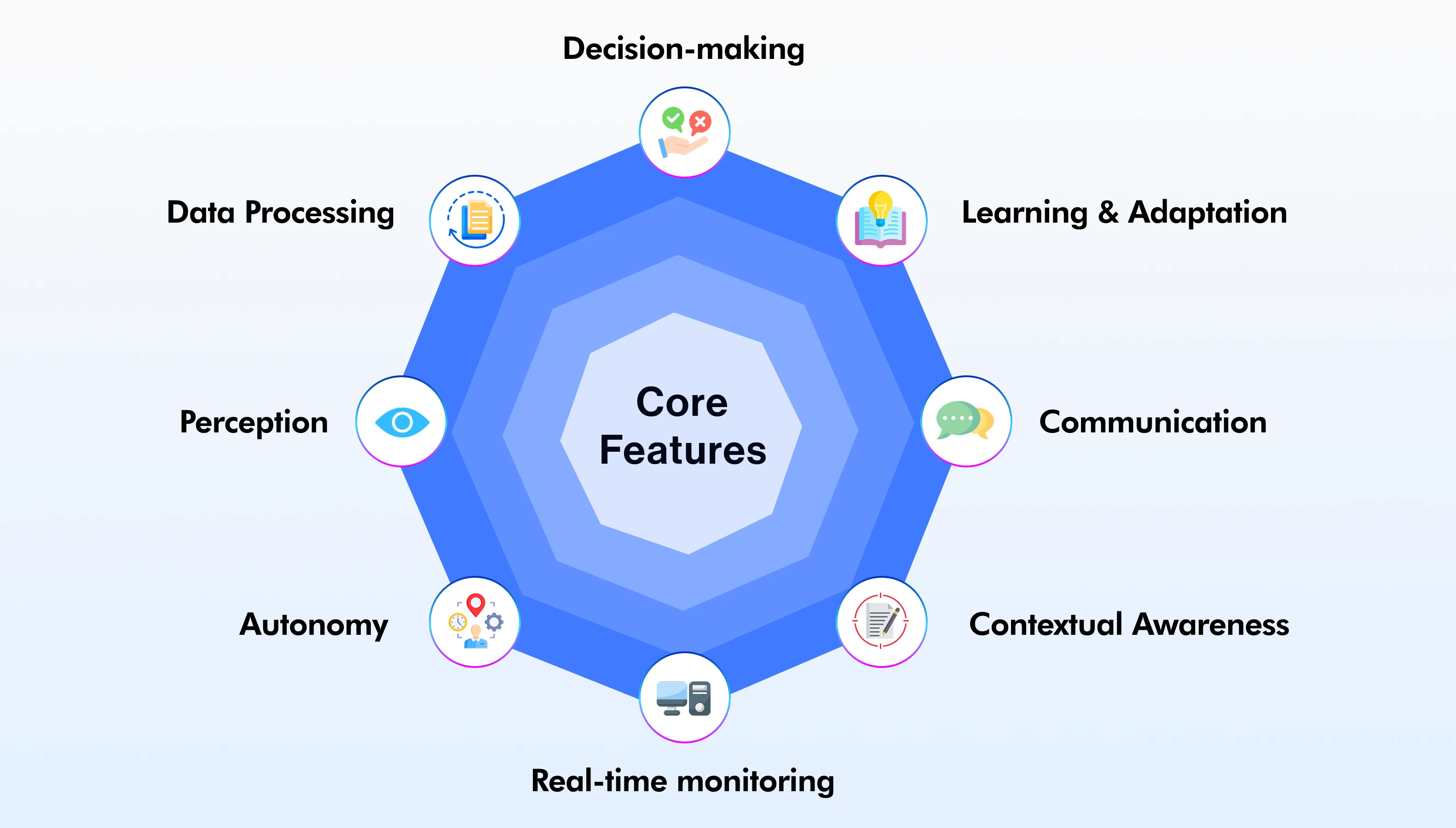
As we discussed before, AI agents are intelligent systems that automatically perform tasks, adapt to new situations, and make decisions with minimal human intervention. But what sets them apart? Let’s explore the features that make automated AI agents versatile in marketing applications.
-
Autonomy: AI agents work independently without human intervention. It means you can use AI in any application across marketing.
-
Perception: AI agents collect data through sensors or input methods, like text, images, and audio, to get a complete picture of their environment for all use cases.
-
Data Processing: Advanced algorithms enable AI agents to process data through NLP understanding or pattern recognition, uncovering actionable insights to power AI agents for marketing.
-
Decision-making: With learned experiences and probabilistic models, AI agents evaluate options, pivot strategies, and choose actions to address evolving AI agent use cases.
-
Learning and Adaptation: Machine learning enables automated AI agents to improve, refine their experience, and adapt to real-world challenges.
-
Communication: AL agents can talk to users or systems through natural language understanding (NLU) and speech recognition for seamless collaboration.
-
Contextual Awareness: All agents maintain the context of tasks or conversations and provide nuanced responses using historical data, enhancing performance in marketing.
-
Real-time monitoring: Constant analysis of live data streams, AI agents detect anomalies and provide timely suggestions to optimize decision-making and problem resolution in critical operations.
The Working Mechanism of AI Agents in Marketing
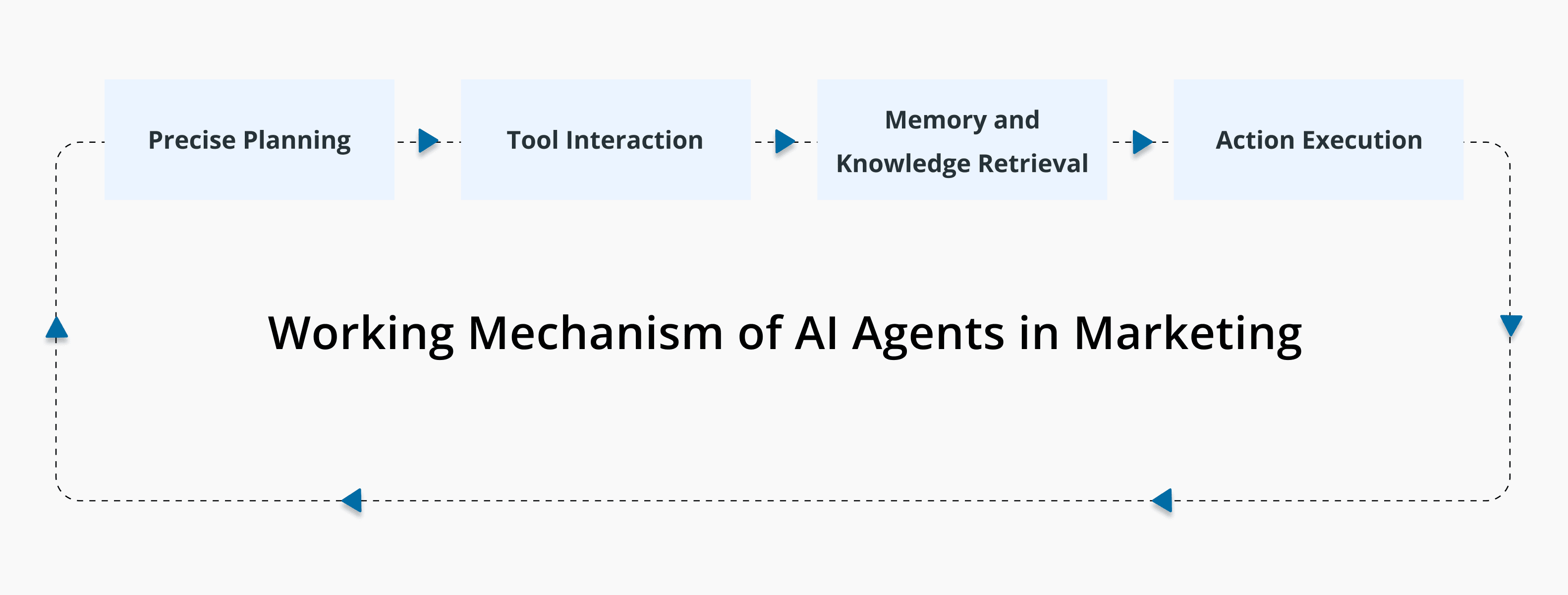
AI agents are intelligent systems designed to perceive their environment, reason about it, and take action to meet specific objectives. These agents are powered by four key components, enabling them to act autonomously and solve complex problems. Their working mechanism in marketing involves the following steps:
-
Precise Planning: Every AI agent starts their work with a goal. For example, you can give a task such as drafting an email or researching a market trend. The agent will define what needs to be achieved and break the goals into manageable steps. You can make use of techniques like chain-of-thought reasoning to ensure ideal results. It eliminates the need for humans to predefine every action.
-
Tool Interaction: Unlike basic LLMs, AI agents will interact with external tools, databases, and APIs. They can browse the web, access customer databases, and use APIs to collect information or perform any tasks. It enables them to extend their capabilities beyond static data.
-
Memory and Knowledge Retrieval: AI agents can store and retrieve specific knowledge, including company data or proprietary information. It integrates techniques like retrieval-augmented generation (RAG), which can provide up-to-date, accurate responses based on external resources. It will make your marketing strategy smarter and more context-aware over time.
-
Action Execution: AI agents don’t suggest solutions; they act. From writing reports to automating workflows, they execute tasks autonomously. They also often interact with other AI agents to complete complex workflows without the need for human intervention.
Real-world applications and use cases of AI agents in marketing
Artificial Intelligence agents represent one of the most intriguing advancements in modern computing. In essence, AI agents are capable of autonomously perceiving their environment, making decisions based on their perceptions, and acting on those decisions to accomplish their goals. These agents are becoming extremely prevalent in marketing, and their applications will continue to grow.
In fact, according to recent statistics, the market for AI agents in marketing is growing rapidly. The global AI agents market is currently valued at around $7.38 billion currently, expected to reach $47.1 billion by 2030, growing at a CAGR of 44.8%. Let us explore some of the real-world applications and use cases of AI agents in marketing.
1.) Customer Support AI Agents
AI agents are reshaping customer service by automating responses, providing personalized support, and handling increased volumes of queries. Marketing agencies are witnessing significant improvements in customer satisfaction and efficiency. Like, Zendesk AI-powered platform help in automating customer support, reducing response time, and enhancing user satisfaction. The brand claims that AI tools have reduced ticket response times by 30%.
Similarly, there is Ada that automatically responds to FAQs, managing high-volume queries effortlessly. It reports that its AI bots have handled 80% of customer inquiries without human intervention.
2.) Virtual Assistants
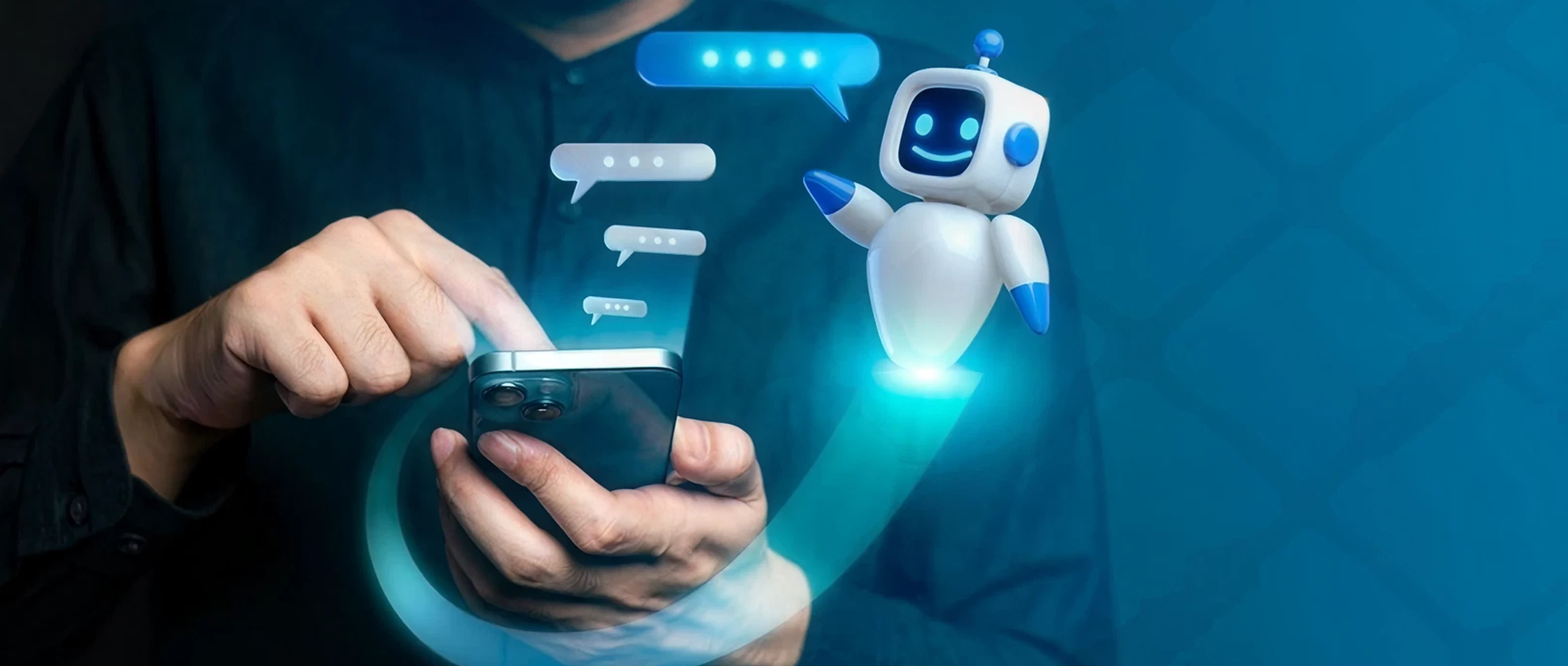
Virtual Assistants have become an integral part of everyone’s life, helping in managing tasks, controlling devices, and getting information. These AI agents are now embedded in millions of home and marketing businesses worldwide.
Amazon’s voice assistant has been installed on over 100 million devices. It controls smart home devices, setting reminders and playing music. Google Assistant, used by over 500 million devices, helps you with tasks and answers questions. It is known for its accuracy, with a 92% rate in answering general knowledge questions.
3.) AI agents for Creative Content
AI agents are also transforming content marketing by providing tools that will help you generate content quickly and efficiently. These AI-driven platforms are built to understand language and visual aesthetics, making content creation faster and more accessible. Jasper AI helps create high-quality content like blog posts and marketing copy within seconds. It saves 80% of your time spent on content creation.
Similarly, for creating high-quality images, DeepArt.io is an AI tool that transforms photos into artworks by mimicking the style of famous artists like Picasso. It claims that it turns ordinary images into unique prices with a 95% rate of user satisfaction.
4.) Sales and E-Commerce Bots
AI agents are transforming the sales and eCommerce industry by enhancing customer engagement, auditing processes, and providing data-driven insights. These intelligent bots help your business to optimize its customer interaction and increase conversion rates. Salesforce Einstein is an AI-powered sales optimization tool that provides predictive analytics, automates sales workflows and personalizes customer interactions. Companies using Einstein AI have witnessed a 40% improvement in sales production.
5.) AI Agents for Collaboration and Productivity
AI-powered productivity tools streamline workflows, automate repetitive tasks, and improve workplace efficiency. These AI agents promote collaboration by integrating with team communication platforms and document management systems. Here are some real-world examples:
Slack’s AI teammates your team workflows, schedule meetings, and organize information across conversions. Another popular tool used by businesses and organizations is Notion. It has an integrated AI tool, which is Notion AI, that promotes document editing, summarising, and project management. It helps you to write faster, generate items, and structure tasks effectively.
Advantages of using AI Agents for marketing success
Artificial Intelligence agents are becoming indispensable in modern marketing, offering significant improvements in accuracy, user experience, and efficiency. Their ability to automate tasks, analyze large data, and scale operations seamlessly is reshaping the industry. Let us explore the primary advantages of AI agents in the marketing industry.
-
Tech Enthusiasts
Generative AI offers endless possibilities for creative projects and startups. Go-getters can leverage Gen AI to build ground-breaking solutions. They can automate processes and enhance user experiences. This scenario can turn ideas into reality with swift speed and efficiency.
-
Improved Decision Making with Data-Driven Insights in Real-time
AI agents excel in processing vast amounts of data in real-time, providing you with accurate and actionable insights. It will help you to make informed decisions based on updated information rather than relying on intuition. With data-driven analytics, you can anticipate market trends and precut consumer bahus to drizzle your gaming strategies.
-
Personalization for Tailored User Experience
AI agents are transforming user experiences by delivering highly personalized interactions. It helps you to analyze user preferences, behavior, and past interactions. AI-powered systems can tailor recommendations, content, and strategies to individuals' uses. As a result, you can create more meaningful and efficient extensions, improving customer engagement and overall satisfaction.
-
Scalability to Handle Increasing Demand
As your business grows, maintaining profitability while managing demand can be a challenge. AI agents provide scalability, allowing you to spend your operations. In marketing for customer service, AI chatbots can handle thousands of inquiries, ensuring you maintain high-quality support even during peak hours.
-
24/7 Availability
Unlike human workers, AI agents can operate continuously without the need for breaks or sleep. Such round-the-clock availability ensures that your services and support are available at any time, improving customer satisfaction and operations efficiently across different time zones.
How Bitontree Can Help You Build AI Agents for Marketing?
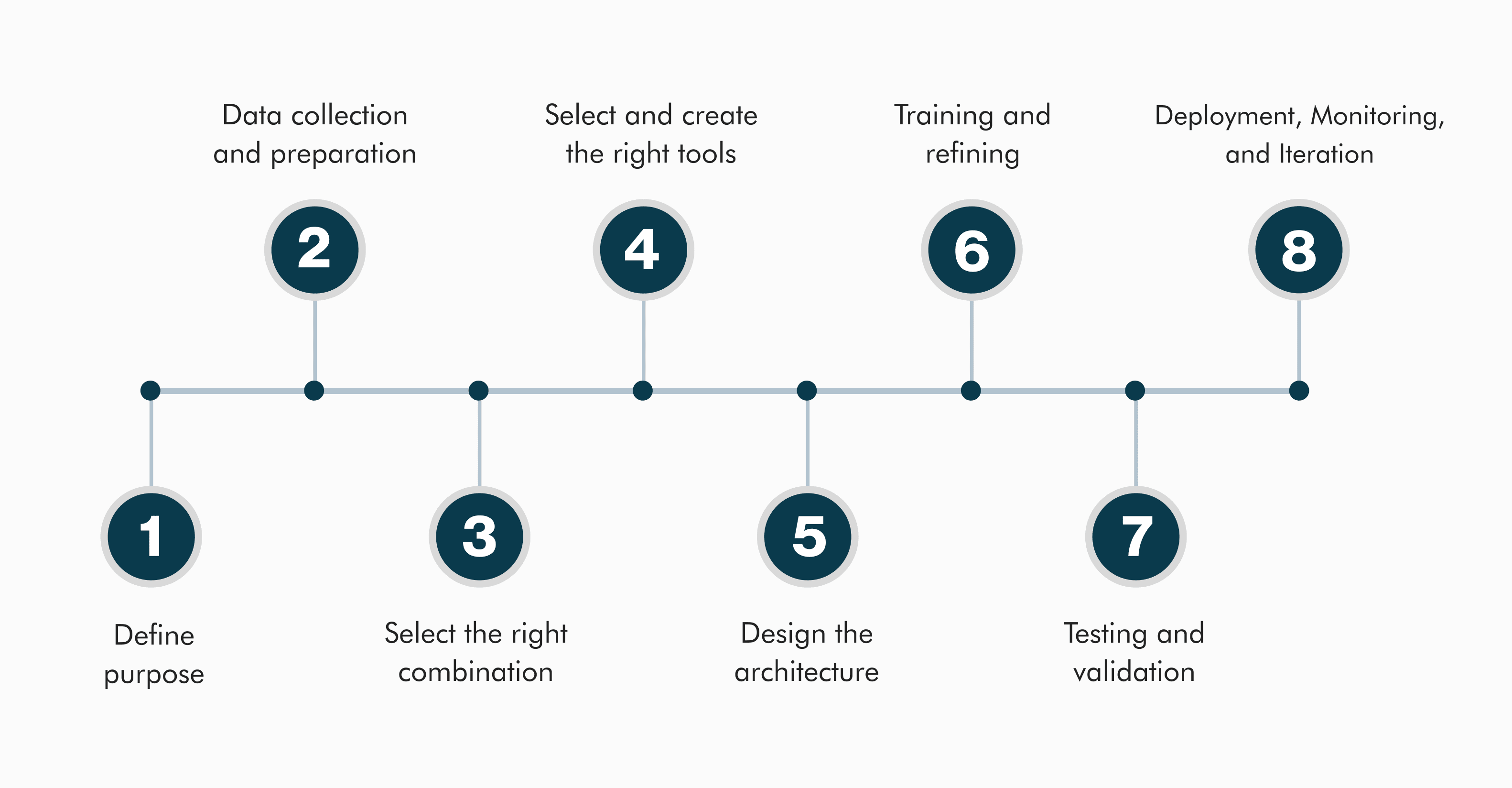
Ever dreamt of building your own AI sidekick? Well, you are in luck! Bitontree is here to help you! Over half (51%) of organizations are exploring the use of AI agents, per KPMG. Another 37% of organizations are already piloting AI agents. Whether you are seeking to streamline your business process or to build a personal assistant, here’s how we help you create your very own AI agent.
-
Define purpose: The first step is to clearly define your purposes and align them with your business requirements. It identifies the tasks it will perform, the goals it will achieve, and the metrics for success.
-
Data collection and preparation: Once the purpose is established, the next step is to gather and prepare the data that will fuel your AI agent.
-
Select the right combination: Choose the right machine learning models, ensuring they align with the agent's objectives and available data.
-
Select and create the right tools: Equip your AI agent with the right tools for seamless operations, ensuring scalability, efficiency, and ease of integration with existing systems.
-
Design the architecture: A well-structured architecture ensures that the AI agent is robust, scalable, and capable of handling complex tasks, enabling easier maintenance and future upgrades.
-
Training and refining: Feeding the prepared data into the selected models and fine-tuning them to achieve optimal performance.
-
Testing and validation: Rigorous testing and validation to evaluate the agent’s performance against predefined metrics and conduct real-world simulations.
-
Deployment, Monitoring, and Iteration: Once validated, the agent will be deployed with regular updates and iteration to ensure it remains effective and aligned with business goals.
Best practices for implementing AI agents in marketing
Now you know that AI agents streamline your business operations with their autonomy and intelligence. But how do you ensure they remain reliable and ethical yet efficient? While implementing AI agents in your marketing process, here are some best practices to consider.
1.) Define Clear Goals
To successfully implement your AI agents, you need to define their purposes. Ask yourself - what specific goals do you want to achieve with the AI agent? Here are some examples to consider,
-
Booking sales meetings
-
Qualifying and capturing leads
-
Managing inventory
-
Analyzing data and creating reports
-
Supporting customers
-
Onboarding employees
You also need to define which AI agent mode you plan to support. Do you need voice-based agents or text-based agents? You might want multimodal AI agents that will improve user experience. A clear preference of these gals will help you choose the right agentt that fits your needs.
2.) Reduce AI Hallucinations
AI can also make mistakes. AI agents sometimes generate false answers and present them as facts. This, known as AI hallucinations, can hurt user experience. Since an AI agent’s performance mostly depends on its training, make sure your training material is accurate, up-to-date, and biased. For instance, if you are creating an AI agent for sales, your training materials should include details about products, pricing, policies, and FAQs. On the other hand, if you are using a no-code AI agent, give specific prompts that clearly define what you want the AI agent to do.
3.) Set up Integrations
Integrate our AI agent with existing platforms and tools to increase its problem-solving capability. You can connect the agent to your website, CRM platforms, email marketing tools, social media platforms, call center software, project management tools, or databases. It will allow your AI agent to access necessary data, perform its tasks, and share outputs.
So, figure out which integrations would make your AI agent more effective. Set them up through in-built integrations, using API-based integrations, or using automation tools. Make sure these integrations are reliable and safe.
4.) Loop in Humans
Although AI agents can automate multiple business processes, they can’t do everything on their own. Human intervention and oversight can make them far more reliable and effective. There are two ways humans can be in the loop:
-
Humans monitor the AI agent's performance and step in when necessary. It is suitable for advanced AI agents that have reached a certain level of performance.
-
Humans directly control the AI agent’s decisions and actions. It is better for AI agents who need instructions and guidelines to perform better.
For distance, an AI agent for customer support can answer most of the queries. However, they may fail or struggle to respond to unexpected or complex questions. In such cases, the agent should transfer the conversations to a human agent who can resolve the issue effectively.
5.) Ensure Data Privacy and Security
If your AI agent deals with personal and sensitive data, you must maintain the highest security standards. Robust security measures protect your AI system from data breaches and manipulation, building trust with users. Therefore, make sure your AI agent complies with regulations like GDPR and CCPA to ensure the data is being handled responsibly.
Also, be transparent about how your AI agents collect and use user data, including security measures like data minimization, adversarial training, data encryption, access control, and regular security audits.
6.) Align the AI agent with your Brand
Your AI agent should appear like it’s a part of your brand. It will increase the familiarity of your brand, deliver a consistent experience, and build customer trust. So make sure your agent’s communication style, personality, and welcome messages should align with your brand.
The Bottom Line
AI agents for marketing are no longer futuristic concepts - they are inevitable tools driving efficiency, innovation, and competitive advantage. As the technology continues to advance, we can expect even more sophisticated AI agents to merge, revolutionizing the way of marketing.
Whether you are a small business or a global brand, integrating AI agents in your marketing efforts is no longer a luxury—it's become a necessity. Take the first step towards smarter, more streamlined marketing today. With Bitontree by your side, the future of marketing isn’t just within reach—it's right here, ready to help your business grow.
Supercharge Your Marketing with Intelligent AI Agents!
Related Blogs
Frequently Asked Questions
Yes, AI agents can be customized for various industries, from e-commerce and finance to healthcare and SaaS, tailoring marketing strategies to specific business needs.
AI agents assist with content generation, customer engagement, lead qualification, personalized recommendations, ad targeting, performance analysis, and automated responses via chatbots.
By automating tasks, reducing manual errors, optimizing ad spend, and delivering data-driven insights, AI agents help businesses achieve better results with lower costs.
Absolutely. AI-powered agents personalize email campaigns, segment audiences, optimize subject lines, and analyze response data to increase open rates and engagement.











